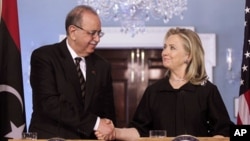It has been four months since Libyan rebel groups ousted brutal dictator Moammar Gadhafi. During that time, the interim Libyan government has been hard at work putting the country back together.
Following a recent meeting with Libyan Prime Minister Abdurrahim ElKeib, U.S. Secretary of State Hillary Clinton said there has been progress in three key areas: building an accountable, effective government; promoting a strong private sector; and developing a strong civil society.
On the government front, the interim leadership in Libya has established an inclusive election law and set up a supreme elections commission with the goal of holding constitutional assembly elections in June. This is a critical first step that will pave the way for a new constitution grounded in democratic principles.
The United States stands behind the elections commission as it works to meet its deadlines so Libyans can ultimately elects a fully democratic parliament that can begin delivering results for all Libyans.
The United States is encouraged by the prime minister’s commitment to build an environment that respects and protects human rights and rule of law. The Libyan government committed to investigating and holding accountable those responsible for human rights violations, which will build a foundation for respecting all people, including the most vulnerable. The U.S. offered assistance in addressing human rights concerns and continues to support emerging Liyban activists, including women.
The United States is also working with its Libyan partners on border security, migrant treatment, integrating militias, and working toward national reconciliation.
At the same time, on the economic front, business is picking up. Libya has exceeded all expectations in resuming oil production after the end of hostilities last year. The U.S. and United Nations have removed almost all restrictions on doing business in Libya and the U.S. is encouraging American companies to look for opportunities to invest in Libya.
The U.S. is also supporting the new civil society that is developing in Libya. The U.S. Middle East Partnership Initiative and the United States Agency for International Development Office of Transition Initiatives are working with many civil society groups on various transition issues.
The United States is also working to find ways to promote partnerships and exchanges in the health field in order to assist the war wounded.
The United States looks forward to working with the Libyan government and people to make progress on behalf of a new, free, and democratic Libya.




